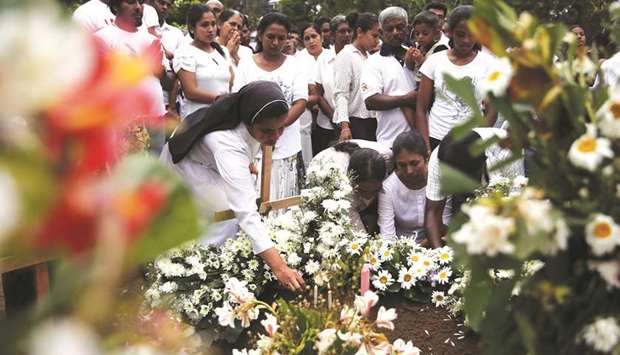Sri Lankan authorities yesterday revised the toll from Easter bombings down to 253, from the previous figure of 359, explaining that some of the badly mutilated bodies had been double-counted. The health ministry said medical examiners had completed all autopsies by late Thursday, and had concluded that several victims killed in the series of attacks had been counted more than once.
The official toll released by the police was reduced by 106 after the reconciliation of autopsy and DNA reports, the ministry said in a statement.
“Many of the victims were badly mutilated... There was double counting,” the ministry said. The health ministry did not break down the new death toll in terms of locals and foreigners. Earlier, Sri Lanka’s foreign ministry had said 40 of the victims were foreign nationals.
Despite the toll revision, the co-ordinated attacks remain the worst in the island nation of 21mn people since a civil war ended a decade ago.
The health ministry said 485 people had initially been hospitalised with injuries, but only 149 remained in hospital as of yesterday evening, with the others being discharged after treatment.
Sri Lankan authorities locked down the central bank and shut the road leading to the jittery capital’s airport because of a bomb scare yesterday as more people were swept up in the search for those behind Easter Sunday bombings that killed 253. Two bank officials told Reuters the street outside the building near the World Trade Center in the capital, Colombo, was blocked to traffic before the security alert was lifted.
Underscoring the nervous atmosphere in the Indian Ocean nation, authorities also shut the entry road to Colombo’s main airport after a suspicious vehicle was spotted at a car park. The road was reopened when the alert was declared a false alarm. A police spokesman also said there was an explosion in a town east of the capital but there were no casualties. The cause was not clear but it was not a controlled detonation like other blasts in recent days and was being investigated, he said.
With fears of more bombers ready to strike, police said they had asked people to leave offices early in Colombo’s business district to avoid throngs at rush hour. City-centre restaurants were also shutting early.
More people, including foreigners, were swept up for questioning overnight as domestic and international authorities investigated deeper into the bombings, believed to have been the deadliest such attack claimed by Islamic State. About 500 people were also wounded in the attacks on three churches and four hotels.
Police said 16 people were detained for questioning overnight, taking the number held since Sunday to at least 76. They include a Syrian national, detained after police got information about him from Sri Lankan suspects. One of those detained overnight was linked to a terrorist organisation, police said, but gave no details. Another was taken into custody after “hate speech” was discovered on their Facebook page.
“It was related to the spreading and preaching of terrorism,” a police spokesman said.
Police later arrested three people and seized 21 locally made grenades and six swords during a raid in Colombo, a spokesman said. He did not give details or suggest that the raid was linked to the suicide bombings. An Egyptian and several Pakistanis have also been detained in the broader crackdown but there was no suggestion they had any direct links to the attacks.
However, authorities have also focused their investigations on international links to domestic Islamist groups – National Thawheed Jama’ut and Jammiyathul Millathu Ibrahim – they believed carried out the attacks. A picture has emerged of a group of nine well-educated, home-grown suicide bombers, including a woman, who carried out the attacks in the South Asian nation.
Two of the bombers were brothers, sons of a wealthy spice trader and pillar of the business community, a source close to the family said.
Islamic State released a video on Tuesday that showed eight men, all but one with their faces covered, standing under a black Islamic State flag and declaring their loyalty to its leader, Abu Bakr al-Baghdadi. The government said there were nine suicide bombers, eight of whom had been identified, and one was a woman.
The man whose face could be seen in the video has been identified as Mohamed Zahran, a preacher from the east of Sri Lanka known for his militant views and Facebook posts who officials believe was the mastermind of the attack. Australian Prime Minister Scott Morrison said another of the bombers had lived in Australia with his wife and child on a student visa but left in 2013. Morrison did not identify the man, although his family have said his name was Abdul Latheef Mohamed Jameel.
Sri Lanka’s 22mn people include minority Christians, Muslims and Hindus. Until now, Christians had largely managed to avoid the worst of the island’s conflict and communal tensions.
President Maithripala Sirisena was due to meet representatives of different faiths yesterday to address concerns of a sectarian backlash.
Muslims have fled the Negombo region on Sri Lanka’s west coast since scores of worshippers were killed in the bombing of the St Sebastian church there on Sunday. Communal tensions have since flared.
Hundreds of Pakistani Muslims have left the port city, crammed into buses, after threats of revenge. “Because of the bomb blasts and explosions that have taken place here, the local Sri Lankan people have attacked our houses,” one of them, Adnan Ali, told Reuters on Wednesday as he prepared to board a bus.

People attend the funeral of Dhami Brindya, 13, a victim of suicide bomb attacks on Easter Sunday, in Negombo, Sri Lanka.
